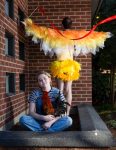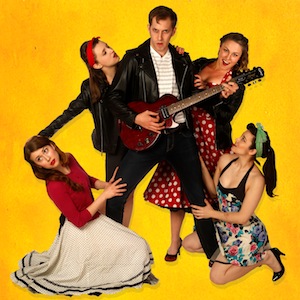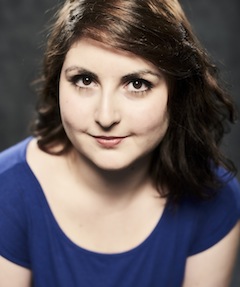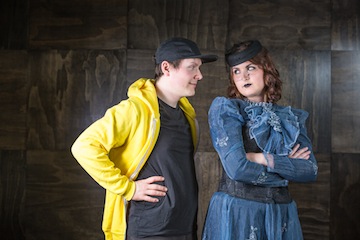Eden Lyons as Emory (seated) and Nathan Cottell as Linda in Awkward Stage Production’s MilkMilkLemonade, which runs May 23-26 at CBC Studio 700. (photo by Javier Sotres)
True to form, Awkward Stage Production’s upcoming show, MilkMilkLemonade by Joshua Conkel, will challenge and entertain audiences.
“Eleven-year-old Emory dreams of two things – leaving his farm for Mall Town, U.S.A., and going on Star Search. His grandmother wants him to be a normal boy and be friends with Elliott, the tough boy from down the road. Meanwhile, Linda, his depressed best friend, dreams of surviving to the next dawn,” reads the synopsis, noting that Linda is a giant chicken who does stand-up comedy and that the show includes the music of Brittany Spears, Spice Girls and Nina Simone.
Jewish community member Eden Lyons plays Emory. With Arts Umbrella Pre-Professional Troupe, she played Mrs. Tottendale in The Drowsy Chaperone in 2016 and Hope Cladwell in Urinetown last year. Her resumé includes stilt walking as a special skill.
“I’ve been interested in acting and musical theatre for as long as I can remember, I was a very attention-hungry child,” Lyons told the Independent. Nevertheless, it wasn’t until her role in Urinetown that she knew she wanted to make a career of performing.
Born in Hamilton, Bermuda, Lyons has lived in Vancouver since she was 3 years old. She attended Vancouver Talmud Torah from preschool to Grade 7 and graduated from Point Grey Secondary School last June. When she left VTT, she said, “I felt somewhat disconnected to the idea of the Jewish community. Maybe because I didn’t feel I belonged from a gay perspective, because I always saw Judaism as more of a conservative traditional thing, as opposed to the ever-changing and loving thing I see it as now. In lots of ways, I feel my safest in the Jewish community.”
A sense of safety is particularly relevant to MilkMilkLemonade, which contains sensitive and explicit material. Producer and choreographer Erika Babins – also a member of the Jewish community – said the play “walks a fine line of comedy and heavy subject matter. Emory is subject to bullying at school because of his effeminate nature. Elliot attempts, and often fails, to reconcile his friendship and attraction to Emory with the internalized homophobia and misogyny that he was raised with. There are both scenes of intimacy and violence in the piece.
“We began rehearsing this play,” she said, “in the wake of controversy in the Canadian theatre community regarding directors and companies crossing professional boundaries in their rehearsal halls in the name of creating art. It brought to light a lot of practices that many theatre artists take for granted as part of the industry and certainly needn’t be. At the beginning of our rehearsal process, we outlined specifically what was deemed appropriate behaviour in rehearsal and what would not be tolerated, in order to create a safe environment for everyone. Actors have to be extremely vulnerable to create situations with physical intimacy and it is the job of the theatre company and the creative team to create and enforce that environment.”
Co-starring with Lyons are Demi Pedersen (Elliot), Stefanie Michaud (Lady in a Leotard), Sachi Nisbet (Nana) and Nathan Cottell (Linda). The producer is Sarah Harrison and the rest of the team is stage manager Laura Reynolds, light/sound designer Andie Lloyd, costume/prop/set designer Alaia Hamer, graphic designer Julia Lank and promotional photographer Javier Sotres.
“The age range of the cast is between 18-27,” said Babins. “All the cast members and creative team on this project are emerging artists.”
Winning the role of Emory came as a surprise to Lyons.
“When I went in for the MilkMilkLemonade auditions, I didn’t even think I would get cast at all, as I hadn’t yet been in a professional show and all I had gotten until then was a string of rejection emails,” she said. “When I got my email for MML, I was at work and I cried in the bathroom and called my parents saying, ‘Maybe I’m not a terrible actress after all!’ This is my first show with Awkward Stage, and I am really thankful that they are the first company I’m working with in my professional career.”
When asked what were the most challenging and fun aspects of playing Emory, Lyons said, “It was a challenge for me to get past my fear of being the youngest in a cast, especially since all of them have already graduated theatre school and worked professionally for years. It was also difficult to find the physicality for acting like a kid, and the balance between me being a woman, who’s playing a little boy, who is actually a little girl. Lots to unpack there. Emory is a really fun role because I get to play around and throw little tantrums and scream, and basically just be a kid. It offers me a lot of freedom to try new things.”
And Lyons is working on many new things in addition to this production.
“I’m currently assistant directing Oklahoma! with the Arts Umbrella Pre-Professional Musical Theatre troupe, which is playing at the Waterfront Theatre from May 18th to 26th, and I am assistant directing and associate producing Jasper in Deadland with Awkward Stage for the Vancouver Fringe Festival in September,” she said. “In the fall, I am moving to Toronto to attend Randolph Academy for Musical Theatre.”
While there is no specific target audience for MilkMilkLemonade – “There are pieces for all ages and walks of life in it,” said Babins – due to the subject matter, she said, “we do advise parental discretion for children under the age of 12.”
MilkMilkLemonade is at CBC Studio 700 May 23-26, 8 p.m., with a 2 p.m. matinée on May 26. Tickets ($20) are available at awkwardstageproductions.com/milkmilklemonade.








